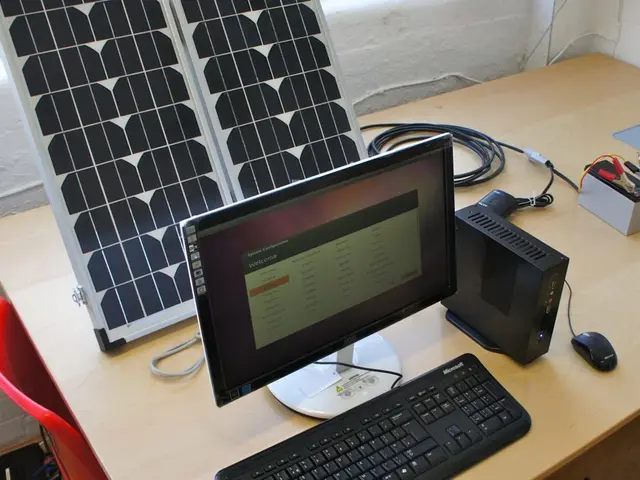Uniper's massive financial losses - a deep and bottomless hole in the balance sheet
A Tale of Uniper's Tumultuous Journey
Energy conglomerate Uniper, currently teetering on the brink of nationalization, has issued grim business figures that expose the full magnitude of their predicament. The company's staggering losses for the first nine months stand at a staggering 40 billion euros, sending a wave of panic through the market as the Uniper share price plummets once again, leaving the company valued at just over one billion euros on the stock exchange.
In a bid to steer clear of catastrophe, Uniper, a vital cog in Germany's gas supply system, has reportedly resorted to purchasing expensive gas to replace the cheaper Russian imports. This survival tactic, as explained by the company's Chief Financial Officer Tiina Tuomela, has resulted in a hefty financial blow. "These hefty gas replacement costs have inevitably led to substantial losses, as the costs aren't passed onto consumers," Tuomela explained.
Russia's decision to cease gas supplies to Germany has left a trail of devastation in Uniper's wake. A supplier to over 100 municipal utilities and major corporations, Uniper had banked heavily on cheap Russian gas. As they scramble to replace the missing supply, the additional costs have blown a hole in the company's finances.
But the losses aren't limited to the gas replacement costs – they also extend to an unexpected 31 billion euros in valuation effects on derivatives and provisions related to Russian gas cuts.
Faced with these financial headwinds, Uniper is pinning their hopes on a stabilization package. The company has reportedly secured credit lines from the state-owned KFW Bank to the tune of 18 billion euros, with around 14 billion euros already used by the end of October.
However, the story doesn't end here for Uniper. The company anticipates further significant losses in the remaining months of the year, though a more detailed earnings forecast remains elusive for the time being. The federal government is set to take over almost 99% of Uniper, including a 8 billion euro capital increase, a move that will likely dilute the existing shareholders' interests.
As part of this takeover, the federal government is also expected to acquire shares in Uniper's Finnish parent company Fortum. While the details are still being ironed out between the various parties, one thing is certain – the state must develop an exit strategy reminiscent of its involvement with Lufthansa. Furthermore, the shareholders' approval is required, with an extraordinary general meeting planned for the second half of December.
The fallout from the federal government's intervention is already being felt, as the feared dilution of shareholders will inevitably occur. With no intention to exclude the existing shareholders, this could compound the pressure on the share price, prompting more investors to sell their shares in an effort to plug the hole.
On Thursday, the Uniper share price slid again, losing more than three percent to 3.04 euros in Xetra trading. Just a few months ago, the share had plumbed new depths at 2.55 euros in September, leaving the former MDAX company with a meager market capitalization of 1.1 billion euros. Swiss banking giant UBS, unsurprisingly, expects further falls in the coming months.
In the eyes of BÖRSE ONLINE, the future looks bleak for Uniper investors, with little to suggest any investment potential apart from brief speculative surges.
(Source: dpa and rtr)
Insights:
- The energy sector, particularly companies like Uniper, face a storm of financial challenges stemming from market volatility, hedging losses, legal issues, strategic disposals, global economic conditions, and competition from renewable energy sources.
- These factors can lead to significant financial distress in traditional energy companies, as exemplified by Uniper's current predicament.
- Uniper's situation is informed by their reliance on cheap Russian gas, which has now been discontinued, forcing the company to buy more expensive alternatives, leading to substantial losses.
- The company's hedging issues and the restructuring process required by EU remedies may also have played a role in their financial difficulties. However, specific figures for Uniper's losses are not detailed in the search results, so we can only speculate about the exact extent of their financial turmoil.
- The nationalization of energy conglomerate Uniper is imminent as the company struggles with staggering quantities of confirmed losses equating to 40 billion euros, primarily due to the discontinuation of cheaper Russian gas imports and the need to purchase more expensive alternatives.
- In an attempt to prevent catastrophe, Uniper, a central player in Germany's gas supply industry, has resorted to measures such as purchasing expensive gas, resulting in hefty financial blows, as these replacement costs have reportedly led to substantial losses.
- The central government is providing a stabilization package to Uniper, including 18 billion euros in credit lines from the state-owned KFW Bank, with around 14 billion euros already used by the end of October.
- Existing shareholders in Uniper's Finnish parent company Fortum may also find their interests diluted as part of the federal government's takeover, prompting further pressure on share prices and potentially leading to more sell-offs.







